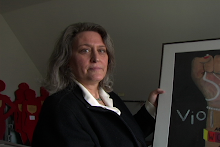Once again, I'm impressed, moved and inspired by the people who spend every day of their lives working to stop domestic violence.
As a relative newcomer to his field (only two years in), I can remember my first fears that everyone involved would be a doctrinaire feminist. I still feel slightly out of place at meetings of domestic violence groups when I look around the room and see that I'm one of the few men around, but I've basically gotten used to that.
Yesterday's presentation to the Manhattan Borough President's Domestic Violence Task Force was another one of those inspiring, affirming moments.
After everyone watched about 20 minutes of our domestic violence film "Power and Control," the conversation turned to the big question of "where do we go from here?"
The excerpts I chose to show yesterday focused on the Duluth Model, and on Ellen Pence and Michael Paymar, co-creators of the Model. Just as I've found that Ellen and Michael are not close minded ideologues holding onto their nostalgia for early 1980s ideas, many of the advocates discussing the film yesterday showed a strong interest in moving forward in search of new paradigms.
For example, one advocate from a major New York advocacy group spoke of how her organization is seeking a fundamentally new approach, a "client-centered" model. That model does not exclusively focus on pressing victims to leave their abusers, but keeps in mind that some clients may want to "stay," and that advocates should respect that choice when it's made for good reasons.
Another advocate at Centre Street, an official from a major NYC social services agency, talked about how her organization is moving more toward having everyone at the table, including the abuser.
And another advocate eloquently and passionately spoke about batterer intervention programs, and how the Duluth Approach, which has defined these programs for several decades, can be respected, and retain its influence, while at the same time practitioners can explore new models for changing batterer behavior.
Now we're not talking about a Mens' Rights meeting here, folks. But we are talking about an impressive group of activists, determined to keep this cause moving forward.
Wednesday, September 29, 2010
Subscribe to:
Post Comments (Atom)








No comments:
Post a Comment